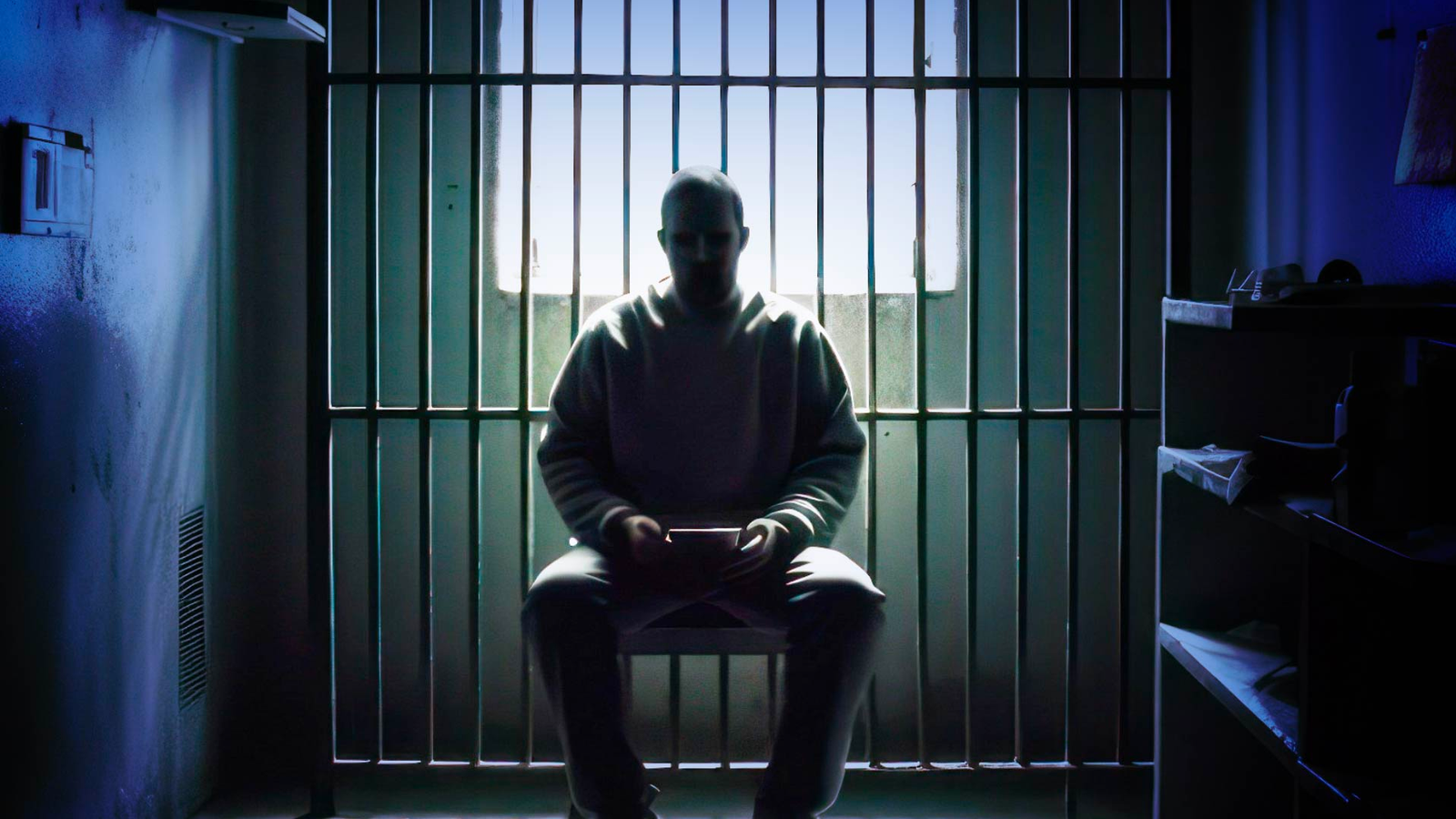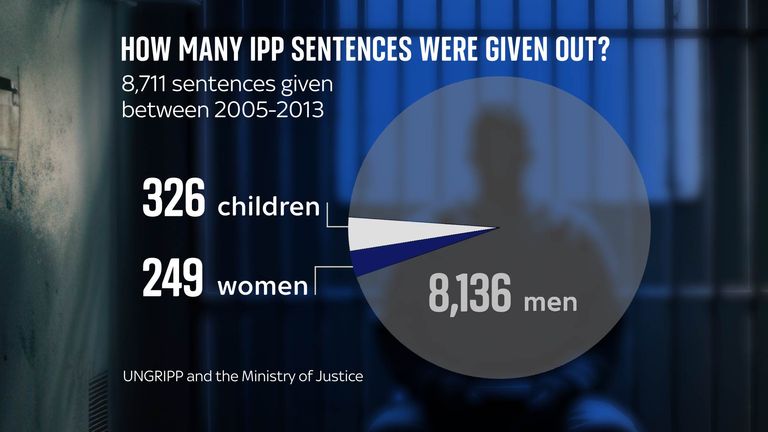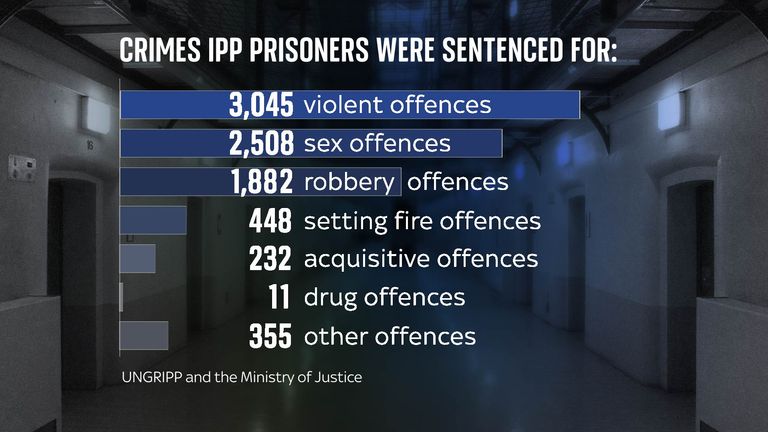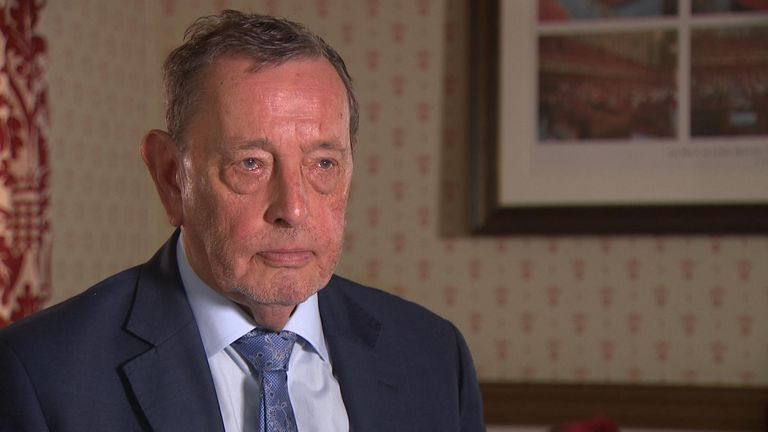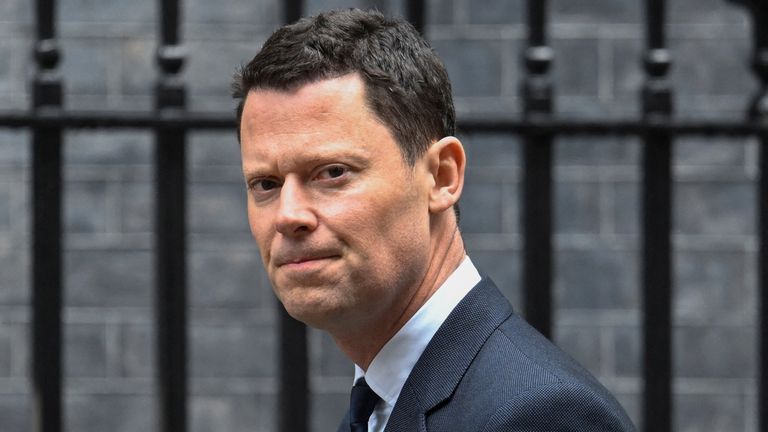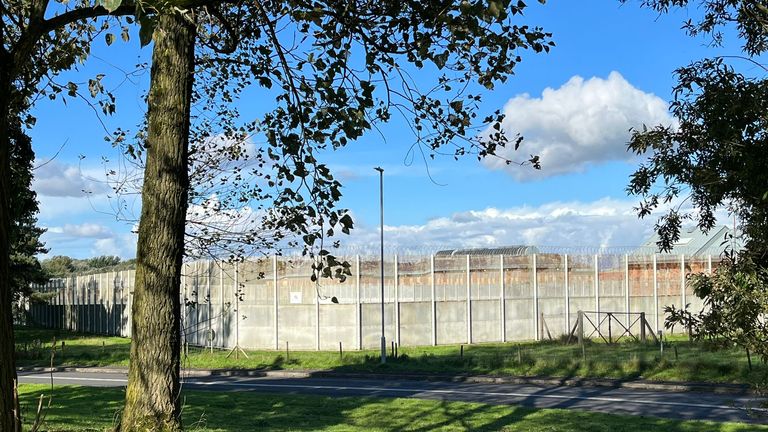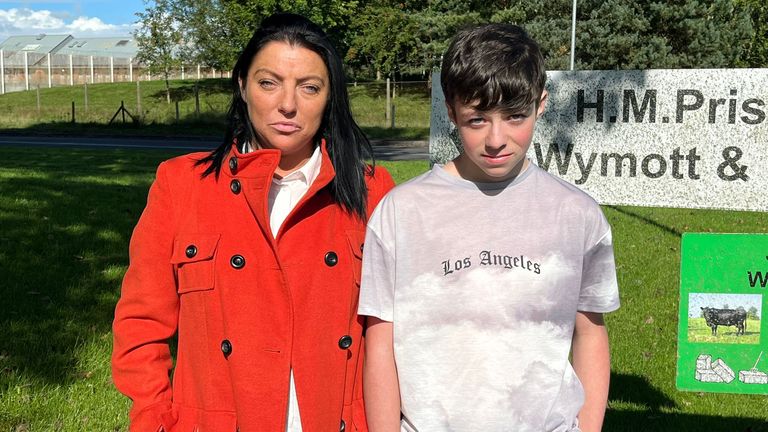“I don’t visit the prison anymore to see him because he’s unrecognisable. His eyes are dark. He’s exhausted – mentally, physically, emotionally.”
This is how Clara White speaks about her brother, Thomas White, who has been in prison for the past 11 years. His crime? Stealing a mobile phone.
During that time – much of which Thomas has spent in solitary confinement – Clara has witnessed her brother “languish” in his prison cell while his mental health has deteriorated to the extent that he has now been diagnosed with psychosis and suffers from hallucinations.
“His language was becoming something we didn’t understand,” she tells Sky News.
“He would tell us that he met Moses in the segregation unit. He wore his bedding as his own clothes. He went round the wings and he would bless people who tell him that he’s Jesus Christ.”
The picture she paints of her brother in prison is a far cry from the musically talented but troubled person who entered it, aged 27, having been handed a special kind of prison sentence that courts in England and Wales could impose between 2005 and 2012.
Called sentences of imprisonment for public protection, IPPs were open-ended prison sentences that were intended for the most serious violent and sexual offenders who posed a significant risk of serious harm to the public but whose crimes did not warrant a life term.
The government’s stated aim was to bring in a new sentence to “ensure that dangerous violent and sexual offenders stay in custody for as long as they present a risk to society”.
But not long after they were introduced, fears grew among politicians that IPPs were being applied too broadly and catching more minor offenders as well as the most serious – partly due to the fact that previous convictions were taken into account when determining whether someone posed a “significant risk”.
Thomas was sentenced to two years for stealing the mobile phone in a non-violent exchange back in 2012, but because he had 16 previous convictions for theft and robberies, he was given an IPP sentence and has served 11 years.
He has only met his son, Kayden, once – when he was nine months old.
Although IPPs have now been abolished, the change was not applied retrospectively, meaning there are potentially thousands more prisoners like Thomas who are being detained for far longer than their original term intended.
Calls are growing for the government to resentence those who remain in jail.
And in an extraordinary intervention, Alice Jill Edwards, the UN’s special rapporteur on torture and other cruel, inhuman or degrading treatment or punishment, has described IPP sentences as “psychological torture”.
‘Unclear, inconsistent and uncertain’
The objective of IPPs was to ensure that repeat offenders who were deemed a risk to the public were not just released at the end of their tariff, but would instead only get out once they had proved they had reformed their character.
Under IPPs, the fate of the prisoner effectively lay in the hands of the parole board, which alone would determine whether or not they could be released based on whether they still posed a threat to society.
But frustrations quickly grew that access to mandatory rehabilitation courses needed to satisfy the parole board were being denied – either through a lack of availability or through long waiting lists – leading to a Catch-22 type situation that left IPPs in a state of limbo.
By 2011, there was growing recognition that IPPs were not working. David Cameron, who was prime minister at the time, called the sentences “unclear, inconsistent and uncertain”.
A year later, in 2012, they were abolished by the coalition government.
But because of the decision not to make this retrospective, many of those who were inside when they were scrapped have stayed inside. Today, that number stands at nearly 2,900 people – including 1,312 prisoners who have never been released.
‘He sits and waits for the day’
One such prisoner is Aaron Graham, who was 25 years old when he was sentenced to two years and 124 days for grievous bodily harm in 2005, in which the victim was left with a broken cheekbone. Eighteen years later, he is still in prison.
His sister, Cherrie Nichol, says he “sits and waits for the day” he will get to experience life outside of prison walls.
“My brother got involved in a fight with two other lads – one of them got off, and my brother and another guy got sentenced,” she explains.
“Aaron ended up with an IPP. At the time, he took it on the chin – he had two years and 124 days to serve, he thought he would pull his socks up and get home.
“When things didn’t materialise after a few years, after a few excuses, people started to take their own lives.”
Since 2005, 81 people serving IPP sentences have taken their own lives, including nine in the whole of 2022 – a record annual total.
“I realised I might lose my brother, on a sentence of no hope,” Cherrie says. “I don’t want him to be next.”
She adds: “Yes, my brother got into a fight and he should have had the time he got. But Aaron does not pose a risk – the only risk is him dying in prison not being able to cope with his sentence and what it’s done to him; the longer he’s left not knowing when he may be home.”
‘Psychological torture’
Ms Edwards at the UN is unequivocal that the preventative aspect of IPPs – keeping people in prison for what they might do – is wrong.
“I do think this is one of the most scandalous stories in the British justice system in a long while,” she tells Sky News in an exclusive interview.
“The psychological effects on the individuals would amount in my opinion, depending on an individual assessment, to psychological torture – or at least psychological, inhuman or cruel treatment. It’s certainly of that calibre.”
‘Follow the evidence’
There is one man who has led the charge for IPP reform for decades.
His name is Lord David Blunkett – the former Labour home secretary who introduced them back in 2005.
He explains that while the motive behind IPPs was “well intentioned”, he feels “deep regret” for the long-term consequences felt by those serving them.
“While the original intention, I stand by because it was a very reasonable thing to do, the implementation was a major mistake, and I’ve taken my share of blame for that,” he says.
“I obviously have deep regrets because of the consequences to individuals down the line – which is why I’m in touch with so many of them, and have spent a number of years now trying to bring about rapid and reasonable change.”
Lord Blunkett is supporting a campaign by Sir Bob Neill, the Conservative chair of parliament’s Justice Select Committee, that is urging the government to carry out a resentencing of the remaining IPP population.
Sir Bob is calling for this through an amendment to the Victims and Prisoners Bill going through parliament, which he says has received cross-party support.
“What I’m proposing in my amendment is that because it’s unusual to retrospectively change sentences – but not impossible – that we set up an expert committee of senior judges and lawyers to give the government the best steer on how best to do that.”
Sir Bob hopes that the justice secretary, Alex Chalk, will show a more of willingness to consider his proposals than his predecessor Dominic Raab, who flatly rejected the suggestion on the grounds resentencing would “give rise to an unacceptable risk to public protection”.
MPs and families have identified in Mr Chalk a potential for reform of the system, given his past statements about IPPs.
Mr Chalk, who replaced Mr Raab in April, has called IPP sentences a “stain on our justice system” that “should never have happened”.
However, like his predecessor, Mr Chalk has described facing a “conundrum” in wanting to solve the “injustice” of the IPP sentence while also feeling a duty to “protect the public”.
The justice secretary has revised the IPP “action plan” started under Mr Raab which aims to solve the dilemma by reducing the number of those in prison even further.
For many, it is simply not enough.
In a direct appeal to Mr Chalk, Sir Bob said: “Alex is a good man and a highly experienced criminal barrister. He’s actually seen these sentences in operation in a way that some of his predecessors perhaps hadn’t.
“So I say to him, ‘Alex, you’re a lawyer – follow the evidence’.”
‘The revolving door’ – life on recall
Another aspect to the IPP sentence that hangs over prisoners, and which the government may be more inclined to reform, is recall.
If an IPP prisoner is released, they are put on licence with strict conditions. If a prisoner breaches their licence conditions, they could be sent back to prison at any time.
The licence is for life but they can apply to have it terminated after 10 years. One concession the government is thought to be considering is reducing that period to five years.
According to the campaign group Ungripp, since 2015, when reliable data began to be published, there have been 4,434 incidents of recalling people serving an IPP sentence, including some who may have been recalled multiple times.
Lord Blunkett believes there are now more people in prison on IPP because they’ve been recalled from their licence conditions than there are who have never been released.
“We’re going to reach a silly situation where for very small reasons, the recall conditions end up with a very large cohort, who simply go in and out the revolving door,” he says.
“That has to be broken – otherwise, people just don’t have the chance to restore their lives.”
‘I’m not able to live a normal life’
One IPP prisoner who understands the daily reality of being on recall is Anthony Hipkiss.
Anthony is an ex-IPP prisoner who served 16 years for threats to kill under an IPP sentence and was released in February.
He has been recalled back to prison three times under a licence that he is now subject to for at least 10 years. He says he lives in constant fear of being sent back to prison and cannot fully reintegrate into the community and family life.
“There’s something about this sentence which always stays with you,” he tells Sky News.
“I’ve got a weekly reminder of what I’m serving, I still wear a tag on my leg, which tells me everyday I’m serving that sentence.
“When I see a prison van going past I think ‘what if?’ Sometimes I think they’re coming for me.
“I’m not able to live a normal life. I don’t have permission to do anything.”
Anthony now works for an organisation called On the Out, which aims to help people leaving the criminal justice system.
“I’ve got an unbelievable support network around me – my family and my church and so on but a lot of it is down to me. The onus is on me not to put things wrong this time.”
Asked to reflect on the incidents that put him in prison, he acknowledges it was right he spent time behind bars.
“I was a threat. I was a danger,” he admits. He says the third time he was recalled gave him the “kick up the backside” he needed and showed him “what IPP was all about”.
But he adds: “I never thought I’d be here 16 years later, still going for probation, I don’t think the incident warrants a life sentence. I don’t think the crime warrants a whole life sentence.”
The overall toll of serving an IPP sentence has been tough. He says at his lowest point, he tried to take his own life on three occasions.
“I got to such a point where I was like, I don’t want live no more,” he said. “This thing’s literally become a death sentence for some people.”
‘The international community is watching’
For the UN’s Ms Edwards, the “repetitive” recalling of people could amount to “abuses of process, abuses of power”.
“The government, or the courts, need to really assess whether that detention is lawful. It might be lawful under the law – but that doesn’t mean it’s lawful under international human rights law.”
Her conclusion has led her to believe that IPP prisoners could have a case to take to the European Court of Human Rights, which previously described the sentences as “unlawful”. She has also written to the government urging it to carry out a review of IPPs.
“I hope that there’s some redress without the families needing to go through the laborious process of going through court. But of course, that is open to them.”
‘We’ll do everything we can’
After Thomas’s behaviour became more and more erratic, Clara pushed for an independent psychiatric assessment, which recommended that he be transferred to a psychiatric hospital.
It reads: “Mr White did describe a sense of hopelessness about his sentence and the outcome of recent parole hearings.
“It is probable that this negative experience has contributed to the development of his delusion system and his voices.
“Mr White’s views mirror those identified in the report, which emphasises the psychological harm caused by the IPP sentence, leading to feelings of hopelessness, despair, and which presented a challenge to their progression.”
Families and campaigners hope that with Sir Bob’s amendment, the government will address their pleas for their loved ones to be resentenced.
But could politics, once again, be the deciding factor in the fate of these prisoners?
With a general election potentially just 12 months away, families – and indeed some MPs – are concerned that no political party will want to act out of fear that one mis-step, or one wrong release, could generate a backlash in the media.
On that, Lord Blunkett has a clear message.
“If change is not made in the House of Commons, we’ll do everything we can in the House of Lords.
“We’ve just got to get common sense back into this situation – for the sake of all those including their families who have been suffering this for so long.”
The Ministry of Justice said its updated IPP action plan will provide support for prisoners who are at risk of self harm or suicide and will allow greater access to rehabilitation programmes to help secure their future release and employment.
A spokesperson said: “We abolished IPP sentences in 2012 and have already reduced the number of unreleased IPP prisoners by three quarters. We will continue to help those still in custody to progress towards release.
“These offenders were deemed a serious risk to the public and we make no apologies for putting public protection first by ensuring that each release is properly assessed by the Parole Board.”
Anyone feeling emotionally distressed or suicidal can call Samaritans for help on 116 123 or email jo@samaritans.org in the UK. In the US, call the Samaritans branch in your area or 1 (800) 273-TALK
